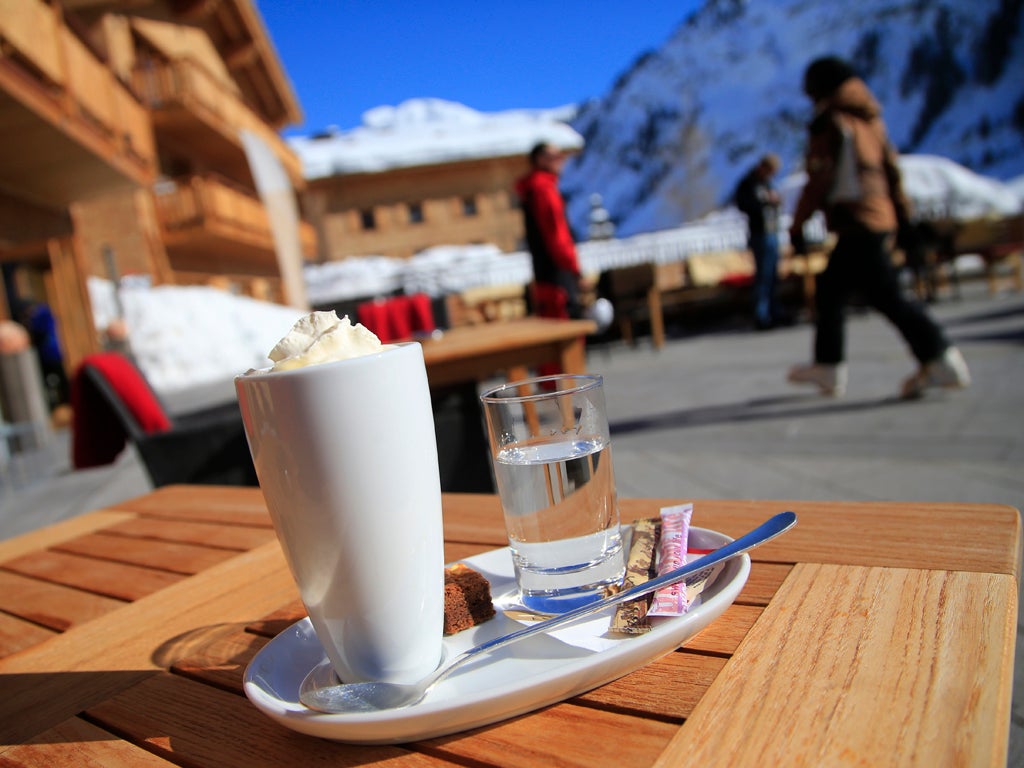Sometimes sky-high prices are worth it - but only in context
When you have little or no opportunity to shop around, it's easy to get ripped-off

Last Saturday I spent a boggling €20 on two cups of underwhelming cappuccino froth and a pair of lukewarm hot chocolate drinks.
My family and I sipped them while sitting outside in sub-zero temperatures, on a hard wooden bench, in uncomfortable clothes. And once we’d finished, I slipped over on a dangerously icy patch of floor and banged my head rather painfully. Did I feel ripped off? Not a bit of it.
Twenty-four hours later, I spent almost exactly the same amount of money on almost exactly the same round of drinks. The cappuccinos were of a similar quality, but the chairs we sat on this time were reasonably well padded, the air temperature perfect (if rather air-conditioned) and I didn’t fall over once. Did I feel ripped off? Well, yes I did, rather.
Of course, in both cases I had a choice. I didn’t have to buy those cappuccinos. I wasn’t particularly caffeine-deprived, or even all that thirsty. I just thought it would be nice.
However, in both cases there was also little or no opportunity to shop around. The first set of drinks was purchased in splendid isolation at the top of a mountain near the smart French ski resort of Tignes. The second was forked out for while corralled with several thousand of my fellow holidaymakers in Geneva airport.
The difference between the two? Contextual and psychological. On Saturday I was drinking expensive coffee while admiring an astounding view of snow-drenched Alpine scenery. We were on holiday. The price was high, but so was our altitude; the hot drinks were part of a glorious family outing on skis. On Sunday, we were on our way home. The world had once again resumed its garb of humdrum ordinariness. The apron at Geneva airport is, I find, a poor replacement for a distant view of Mont Blanc. And the exchange rate – sterling to euros via the insanely strong Swiss franc – didn’t help my mood.
Perhaps the reason it rankled quite so much is that I felt more exploited than when we were at the top of that chairlift. Even I can see that it costs a lot to send cappuccinos up mountains in the middle of winter. (And there’s probably some cunning bit of physics to do with the boiling point of water that means they still won’t taste all that good when they get there.) So I find it relatively easy to accept that you might pay a premium for poor-to-adequate coffee while skiing.
After queuing in the charter terminal in Geneva, then for security, then the shuttle bus, I was perhaps less inclined to accept the undoubtedly expensive process of importing coffee beans to Switzerland, heating them up and delivering them in a cardboard cup to me as I waited for my flight home. However, Geneva airport charges whatever people are prepared to pay, even though it can’t supply glittering views at the same time. And the simple fact is that I paid up, even if I did so grumpily.
The same applies to other items. As well as banging my head, I also twisted my knee (you can probably tell I’m not a particularly accomplished skier) which necessitated a visit to the pharmacy in Tignes. Pharmacies in the Alps specialise in knee-braces and sunscreen, so I bought an example of each, and was immediately €70 (£63) lighter. My local chemist would have charged me around £32 for similar products.
Again, I paid up because I wasn’t at home, I was in the mountains. I was in a place where knee-braces can command premium prices, but where I can also eat cheese fondue and ski down glaciers to my heart’s content.
It doesn’t always work. The English woman behind me in the queue for knee-braces clearly didn’t see things in quite the same way as me. (Or perhaps she was simply in less pain than I was.) The cost, she grumbled to the charming pharmacist, was a disgrace. How, she wondered, could it be justified? The pharmacist gave a Gallic shrug, and the lady left the shop without her leg brace – and with a pronounced limp.
The laws of supply and demand define our world, and that includes our holidays. I might not appreciate it all the time, but the same rules apply in Swiss airports as on beautiful French mountains, or in helpful chemist shops. Perhaps I should just wake up and smell the coffee.
Join our commenting forum
Join thought-provoking conversations, follow other Independent readers and see their replies
Comments
Bookmark popover
Removed from bookmarks